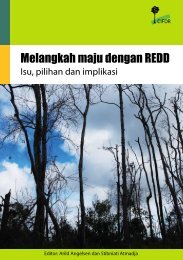Adaptive collaborative management of community forests in Asia ...
Adaptive collaborative management of community forests in Asia ...
Adaptive collaborative management of community forests in Asia ...
You also want an ePaper? Increase the reach of your titles
YUMPU automatically turns print PDFs into web optimized ePapers that Google loves.
20 • Ravi Prabhu, Cynthia McDougall and Robert Fisher<br />
the diverse <strong>in</strong>terpretations <strong>of</strong> experience, knowledge and learn<strong>in</strong>g. (Social<br />
learn<strong>in</strong>g is further explored <strong>in</strong> the subsequent sections <strong>of</strong> this chapter).<br />
In sum, <strong>in</strong> ACM, gather<strong>in</strong>g <strong>in</strong>formation and negotiat<strong>in</strong>g outcomes take<br />
place as part <strong>of</strong> a s<strong>in</strong>gle <strong>in</strong>tegrated and <strong>collaborative</strong> learn<strong>in</strong>g process.<br />
Learn<strong>in</strong>g is not, after all, just about collect<strong>in</strong>g <strong>in</strong>formation, but about<br />
decid<strong>in</strong>g what it means. Where the <strong>in</strong>formation means different th<strong>in</strong>gs to<br />
different people, the attribution <strong>of</strong> mean<strong>in</strong>g works best if it is discussed and<br />
negotiated <strong>in</strong>teractively.<br />
Jo<strong>in</strong>t or collective action<br />
By def<strong>in</strong>ition, adaptive <strong>collaborative</strong> <strong>management</strong> <strong>in</strong>volves action that<br />
is agreed upon and supported by multiple actors. The need for jo<strong>in</strong>t or<br />
collective action reflects the complex nature <strong>of</strong> <strong>forests</strong>, people’s overlapp<strong>in</strong>g<br />
<strong>in</strong>terests, rights and responsibilities, and the result<strong>in</strong>g potential for tensions<br />
between local, meso and national levels <strong>of</strong> governance as well as between<br />
private, government and civil society <strong>in</strong>stitutions. Even with<strong>in</strong> one local<br />
area, the ‘common property’ nature <strong>of</strong> <strong>community</strong> <strong>forests</strong> (whether legally<br />
designed <strong>community</strong> <strong>forests</strong> or not) demands that if actions are to be<br />
acceptable to most forest actors, they will need to be jo<strong>in</strong>tly agreed, if not<br />
jo<strong>in</strong>tly carried out.<br />
One foundational aspect <strong>of</strong> jo<strong>in</strong>t or collective action (and the whole<br />
governance and <strong>management</strong> process) is the need to assemble the ‘right’<br />
actors. This is challeng<strong>in</strong>g, not <strong>in</strong> the least because the def<strong>in</strong>ition <strong>of</strong> those<br />
actors is subjective as well as time, context and issue dependent.<br />
Wollenberg et al. (2001) identify problems associated with collective<br />
action (‘collective agreements’), <strong>in</strong>clud<strong>in</strong>g the fact that transaction costs<br />
<strong>in</strong> achiev<strong>in</strong>g them may <strong>in</strong> some cases outweigh their immediate ga<strong>in</strong>s.<br />
Furthermore, they po<strong>in</strong>t out that the more powerful members <strong>in</strong> a group<br />
tend to take over and control such agreements. They note that it ‘takes<br />
more time, human energy, and material resources to identify all the<br />
relevant forest <strong>in</strong>terest groups, develop platforms on which their <strong>in</strong>terests<br />
can be accommodated effectively, and coord<strong>in</strong>ate <strong>in</strong>terests <strong>in</strong> a way that<br />
respects the legitimacy and autonomy <strong>of</strong> each <strong>of</strong> them than it does to<br />
simply manage <strong>forests</strong> as though they were the sole responsibility <strong>of</strong> the<br />
government’ (Wollenberg et al. 2001).
















